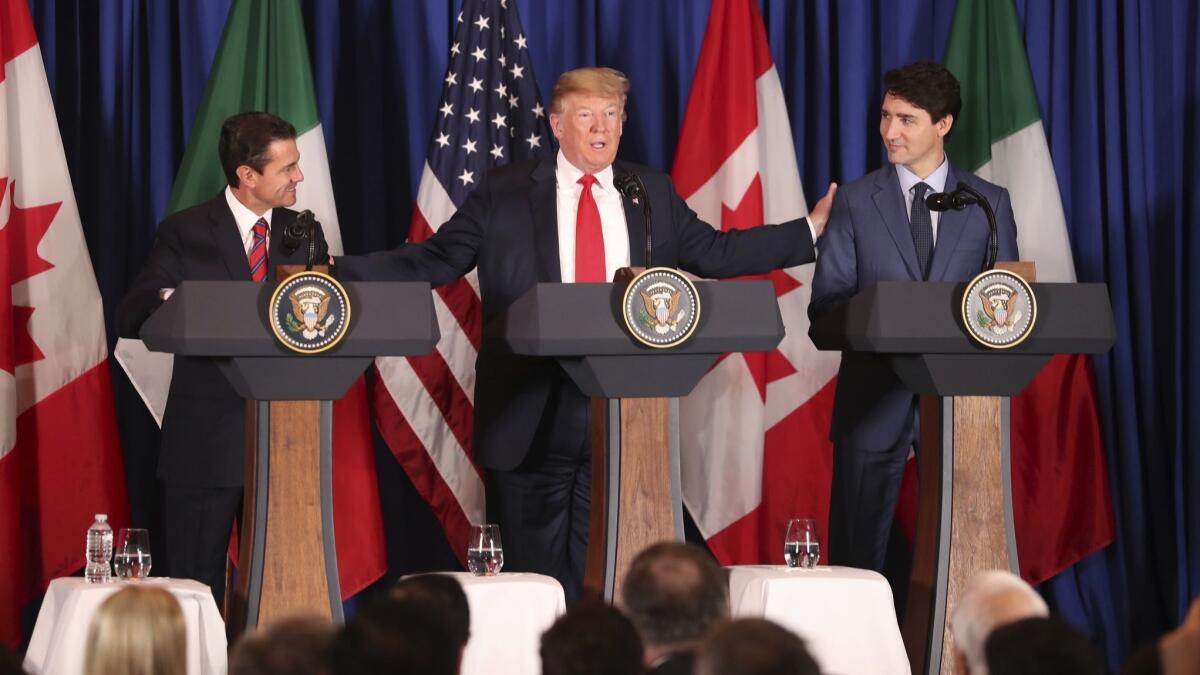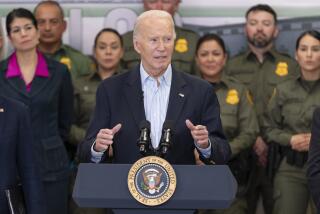Op-Ed: Will the U.S. crash out of NAFTA?

President Trump’s NAFTA 2.0 trade accord — the United States-Mexico-Canada Agreement — is in trouble. Trump carries part of the blame; after all, how does Congress ratify a major trade agreement that includes Mexico even as the U.S. president is threatening to completely shut down the border?
With fingers crossed in hopes that Trump’s anti-Mexico rants will diminish, Republicans are pushing for a summer vote on the USMCA. But the trade agreement’s risk of stalling or rejection in Congress is high — and if that happens, it’s the American people who stand to lose most.
Democrats are digging in their heels. House Speaker Nancy Pelosi insists there will be no vote until Mexico changes worker protection laws, and her Democratic majority would relish dealing the White House a humiliating blow. Making matters worse, some Republicans have serious concerns about the USMCA’s trade restrictions. The GOP congressional caucus has recently been increasingly emboldened to challenge the White House on foreign-related issues, such as Syria, North Korea and NATO.
The trade agreement’s risk of stalling or rejection in Congress is high — and if that happens, it’s the American people who stand to lose most.
There is too much at stake for Congress to play a game of chicken with Trump on the USMCA. If the new treaty goes down, the president will not hesitate to officially abandon NAFTA entirely.
If Congress rejects the USMCA to force additional changes, or stalls the vote until after the 2020 elections, Trump could officially withdraw from the North American Free Trade Agreement without a backup plan, winning him the dramatic and divisive news coverage he craves as well as adulation among his most fervent supporters. And don’t expect anyone in his administration or his advisors to rein him in. The White House Council of Economic Advisors failed to even mention the USMCA in its assessment of key drivers of growth over the next few years.
A no-deal scenario could be catastrophic. The USMCA is the best opportunity available to preserve free trade with our neighbors and crucial economic partners. Since NAFTA went into effect in 1994, U.S. trade has quadrupled with Mexico and Canada, which are also the top destinations for exports from small and medium-size U.S. businesses. Casting aside what is essentially just an altered version of NAFTA is throwing the baby out with the bathwater.
In a Brexit-like replay, observers are sounding the alarm on the risk of a hard exit from NAFTA. If the USMCA replaces NAFTA, our baseline economic growth will stay about the same. But a sudden ending of NAFTA would be devastating. Trade Partnership Worldwide, a research firm, estimated last year that withdrawing from NAFTA with no replacement could eliminate 1.8 million to 3.6 million mostly blue-collar jobs in the next few years.
Failure to pass the USMCA will also damage U.S. credibility on trade just when it is needed most. Upcoming talks between Trump and President Xi Jinping are crucial to successfully ending the trade war with China, which has hit American farmers hard. The inability to ratify or implement a major Trump trade deal will have inevitable negative consequences on the U.S.-China negotiations.
Enter the Fray: First takes on the news of the minute from L.A. Times Opinion »
The potential damage to U.S.-Mexico relations is incalculable. That Trade Partnership Worldwide report also notes that a no-deal situation would put 2.3 million to 10.3 million Mexicans out of work, potentially reversing the dwindling Mexican immigration numbers of the last decade. Notwithstanding Trump’s rhetoric and criticism, Mexico is a trusted U.S. partner in reducing immigration, fighting drugs, cooperating against transnational crime and containing international terrorist groups. Imagine what happens if that cooperation ceases.
There is room for improvement in the USMCA. But this issue is not the right one to test the ego of our president and his commitment to campaign promises. Nor is it the time. With U.S. elections around the corner, whatever bipartisan coalition that could possibly be mustered today will vanish in 2020’s electoral noise.
Congress should treat the USMCA as a necessary stopgap to preserve free trade on the continent from a White House that is unusually hostile to cooperation with our most important economic partners. It’s up to Congress to ratify the trade agreement and prevent a no-deal crash out of NAFTA.
Peter Schechter was the founding director of the Atlantic Council’s Latin America Center. He hosts “Altamar,” a global issues podcast. Twitter: @PDSchechter
Follow the Opinion section on Twitter @latimesopinionand Facebook
More to Read
A cure for the common opinion
Get thought-provoking perspectives with our weekly newsletter.
You may occasionally receive promotional content from the Los Angeles Times.






